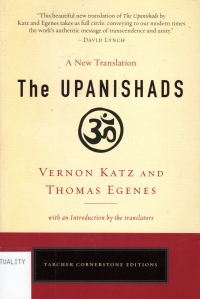 I picked up this book from the library not long after reading Tao Te Ching. I mean, why not? I’ve also read a couple books on Buddhism recently (Zen Mind, Beginner’s Mind, Start Here Now, and Buddhism Through Christian Eyes) and Tao Te Ching. Why not touch on that other large Asian religion, Hinduism?
I picked up this book from the library not long after reading Tao Te Ching. I mean, why not? I’ve also read a couple books on Buddhism recently (Zen Mind, Beginner’s Mind, Start Here Now, and Buddhism Through Christian Eyes) and Tao Te Ching. Why not touch on that other large Asian religion, Hinduism?
Like the Tao Te Ching, I think I might have read this book before, or at least parts of it. I did have a class on Eastern Philosophy, after all, which I denigrated at the time because Father Naus (not Nous because how cool would that have been) used to stand at the lectern, holding the texts, and saying “I don’t understand that, but maybe that’s the point.” Now that I’m a little older and have read more of them, I can understand his point of view and think maybe he’s right.
This book includes many but not all of the things called “Upanishad.” The book includes:
- Isha Upanishad
- Kena Upanishad
- Katha Upanishad
- Prashna Upanishad
- Mundaka Upanishad
- Mandukya Upanishad
- Taittiriya Upanishad
- Aitareya Upanishad
- Shevetashvatara Upanishad
It’s kind of like reading the psalms of Hinduism. The Vedas are earlier works, I remember from my class, and these are later poetical reflections on them that are also canonical.
At any rate, many of them talk about the basics of Hinduism, including the form of Brahman, the eternal, and the Atman (the bit of eternal incarnation that is the individual self) (I think). Some of them refer to the gods lower than Brahman, but you don’t get a cohesive Western style of narrative or lyric. Some of them have a bit of it, but mostly they’re designed to spur reflection and meditation.
Reading this, one cannot help but compare the impression of Hinduism to Buddhism that I got from the other things I’ve read. Both depend heavily upon meditation to get in touch with the inner self, with the Brahman/Buddha nature that is eternal and present within oneself; however, Buddhism is very much about renunciation (Buddha’s first four thoughts are that want creates suffering, so renounce wants), but Hinduism, at least in some of the Upanishads, is about celebrating the things you eat and whatnot. Although I guess that one often thinks of Hindu ascetics, so there must be some strains of Hindu thought that talk about renunciation. That stuff must come from other writings.
Although I delved into this book with some relish, by the time I got two thirds of the way through I was pretty fatigued with reading it. Partially, that stems from reading other speculative primary texts like the Tao Te Ching and this book on Ancient Near East primary texts I’ve worked on a bit. But cumulatively, I have to wonder how many more Eastern thought books I will get through before my current interest in them wanes. I predict…not many.


